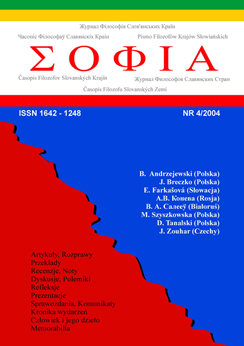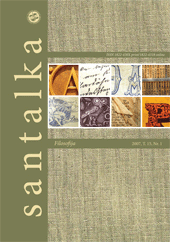
Wartości i antywartości u Słowian
The Round Table of The Philosophers of Slav Countries (30 V 2003)
More...We kindly inform you that, as long as the subject affiliation of our 300.000+ articles is in progress, you might get unsufficient or no results on your third level or second level search. In this case, please broaden your search criteria.

The Round Table of The Philosophers of Slav Countries (30 V 2003)
More...
This article is an attempt at reconstructing a basic concept, which is the philosophical construct called Russian Slavophilism, i.e. the concept of integralily. It is the object of detailed analysis here because it focuses all of the most important dimensions of this intellectual construct, not only the social, but the epistemological and metaphysical dimensions as well. Another intention of this study, delimited by the specificity of the concept as mentioned, was an endeavor to reach a multi-facetted reconstruction of 19th century Russian thought, the specifics of its cultural, religious, and political predisposition, and its localization within the broad context of European philosophical thought.
More...


The author sketches the main trends in Milosz's historiosophic views. He starts with contrasting Milosz's tendency towards a disinterested contemplation of being with his propensity for the understanding of "doing" and the related need of involvement. Miłosz analyzes the extraordinary "acceleration oj history" in the last two centuries. He alsa tries to grasp the exceptionally complicated and tragic sequence of events in a poorly known part of Europe between Germany and Russia, on the territory of old-time Poland. The analysis of Milosz's views on a widely understood globalization concludes the text.
More...




The process of globalization is characterized by several paradoxes, in this paper I will consider one of them - the relation between local and global, especially in the cultural context of the globalization. The paper focuses on the necessity to search for alternatives to the homogenizing model of the globalization and on the necessity of cultural diversity.
More...
The subject matter of this paper is the relation between theoretical cognition and hermeneutics as the practice of comprehension and interpretation. Pointing to the disjoint character of both these fields, the author invokes their traditions as well as differences in the understanding of their definitions and functions. At the same time he points to the mutual interaction of cognition as well as comprehension and interpretation. The author views hermeneutics not as a negation of philosophy but, rather, as a complementation of its cognitive operations and functions. As a corollary, in the awareness of the role of comprehension and interpretation in cognition, i.e. in the so-called hermeneutic consciousness, he observes a subsequent step in attaining self-knowledge by philosophical thought.
More...



This essay contains the analysis of the basic conceptions of Szlemkewycz's book, Filosojija, based on the material of the doctoral dissertation written under the supervision of Moritz Schlick. The work of Szlemkewycz is mostly independent of Schlick's thought, but in certain parts of the text, e.g. while defining the subject matter of ethics, Szlemkewycz follows the lead of his master. This work also sheds light on the philosophical work of Schlick, so tragically interrupted by the death of the great Wiener.
More...
The authors analyse some aspects of the language problem in the history and modern Belarus. The purpose of this paper is to define the role and place of the Belorussian language in the culture and art of Belarus in particular during the period of perestroika and formation of an independent state. The paper also presents a repetitive investigation which was conducted in Brest State Technical University. The results of this investigation show the interest of Belorussian students in the languages (culture) of neighboring nations.
More...
Contemporary hermeneutics has turned from the art of textual interpretation to the world – constitutive functions of language and symbolic representation. It is stressed that all understanding takes place within horizons constituted by history and language. Building on the ultimate religious foundations of divinely revealed truth, theological hermeneutics reflects upon theology as the site of a circular mediation of Scripture, tradition, and culture. The guiding question of this article is: can a theological hermeneutics retranslate philosophical sources into the language of theology? For these purposes we must at first situate the theological phenomenon of Verbum at the center of philosophical hermeneutics. Secondly, it is necessary to give a brief account of how symbols (all in general and some in particular) function in religious language. Also, we can see that in the face of the dawn of some traditional religious symbols, we can find new ones emerging from new strategies of theological hermeneutics in the face of new ontology. The analysis of symbolic nature of theological hermeneutics directs us to the question of analogy. Eventually the subject of investigations turns to be “validity” of analogical language in theological hermeneutics, which have some paradoxical consequences. On the other hand, it is clear that these paradoxes are not simply about formal matters. It is amazing that the basic symbol functioning in analogical language for expressing the proper language of God-talk (theology) is the language itself.
More...
The North-West region of Belarus as an ethno-cultural bordering area demonstrates the tendency towards linguistic homogeneity with the sustainability of the identities of its communities. On the basis of a constructivistic approach the models of the identification process in the region are grounded. In the framework of these models the opportunities of interpretation of the present-day linguistic structure and specificity of linguistic processes are revealed.
More...
The article consists of two parts. In the first part (I) three different formulations of the principle of the transparency of the sign are described. In the first description (E. Husserl) it is said that the sign in a proper sense (both an iconic and conventional one) is transparent for its denotations. In the second description (A. Schaff) only the transparence of its meaning is admitted. As far as the third description is concerned (L. Koj) conviction, that every sign is transparent both for a signed object and its meaning, is typical. In the second part of the article (II) we consider relationship between the principle of the transparency of the sign and traditional distinction between “transparent” and “opaque” cognitive mediator – distinction between medium quo and medium quod. The main conclusion of this article is included in a thesis that linguistic cognition and significative cognition – because it isn’t a direct cognition in the sense of primary directness (perceptive) – isn’t able to guarantee a source of access to a cognized object, so it is not a direct cognition in a proper sense. It means that the transparency of the sign, when it appears in the face of its denotations (E. Husserl’s interpretations) a sign or a system of signs are not able to function as a transparent mediator, i e medium quo. It is like that because – as E. Husserl noticed – the sign (due to its transparency) indeed shows us its denotations, but always through the mediation of its meaning and some significative intention.
More...
In the article M. Heidegger’s idea, that language is image of being and simultaneously its guidebook, is used. According to M. Heidegger’s concept, it is a poetic language following the principle: “There are no things where words are not present”. A. Toynbee submitted implicity of the language of being by the principle of etherefication (simplification), and in epistemology, according to M. Fuko, between a word and a thing different relations are established, depending on an epoch. In the Renaissance, intention goes from the world to the Word that is deciphered in Divine Logos. During New time, language collects the totality of the world within itself and acts as its Encyclopedia. In the Modernity, since the 19th century, interrelation between a word and understanding of being is mediated by such phenomena as a biological organism of a person and his work. In a superindustrial society, the coded stream of information testifies about a new temporal being, causing pictorial-verbal reloading of a person. Having presented the world as a text, the Postmodernism legitimated the number of earlier forbidden binary oppositions and has given a word to negativism of being. Russian artistic postmodernism made use of experience in the performed legitimation for deleting “a weak person” in the domestic culture with intention of creating a new type of culture because of unsuitability of the old one.
More...